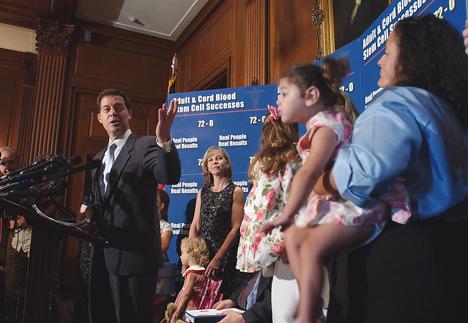Drawing boundaries on stem cell research heart of debate

The Associated Press The Associated Press
Jul 18, 2006
Last updated on May 12, 2016 at 03:42 a.m.
WASHINGTON – In an emotional session marked by tales of death and hope, the Senate debated on Monday whether the government should pay for new embryonic stem cell research, pushing a measure to do it toward passage and President Bush’s first veto.
“He would veto the bill,” the White House declared in a written statement, underlining the words for emphasis.
Judiciary Committee Chairman Arlen Specter, R-Pa., a cancer survivor, said his disease is one of many that might be cured sooner with the engine of federal funding behind embryonic stem cell research.
Specter compared opposition to the bill to historical resistance to research that led to space travel and landmark vaccinations “to show how attitudes at different times in retrospect look foolish, look absolutely ridiculous.”
Get The Daily Illini in your inbox!
“There is just no sensible, logical reason why we would not make use of stem cell research,” he said.
Senate Majority Leader Bill Frist, a transplant surgeon whose negotiations permitted the bill to come to the floor after being stalled for a year, attributed the opposition to “fear (that) can also delay scientific advances that are out there before us.”
Where to draw those boundaries is the heart of the debate.
Bush and his allies believe embryos are nascent human life worth more than the advances they might make through stem cell science and point out that embryonic stem cell research is years away from clinical trials, let alone cures for disease.
“Just because the budding lives would not survive does not mean that we should ghoulishly conduct experiments on them,” said Sen. Jim Bunning, R-Ky.
Sen. Sam Brownback, R-Kan., appeared with three children adopted from in vitro fertilization clinics in an effort to put faces on the argument that frozen embryos could have a future other than being subjects of stem cell research.
“It is immoral to destroy the youngest of human lives for research purposes,” Brownback said. “It is an age-old human debate, whether you allow the stronger to take advantage of the weaker. We have already regretted doing it in the past; we will regret this, too.”
Neither house has demonstrated the two-thirds majority needed to override a presidential veto. Vote counters on both sides said they expected the Senate to pass the bill with at least 60 votes, but they could not predict there would be the required 67 for a veto override.
The Senate was slated to vote Tuesday afternoon. Bush was expected to veto the bill early Wednesday, followed by the House’s override effort.





